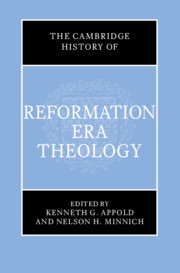Book contents
- The Cambridge History of Reformation-Era Theology
- The Cambridge History of Reformation-Era Theology
- Copyright page
- Contents
- Figures
- Acknowledgments
- Contributors
- Abbreviations
- Introduction
- Part One Theology in an Age of Cultural Transformation
- 1 The Printing Press and its Impact on the Production, Proliferation, and Readership of Theological Literature
- 2 Humanism and Theology
- 3 The Changing Role of the Bible in Theological Discourse
- 4 The Regulation of Theology in the Reformation Era
- 5 Political Change and Theological Discourse
- 6 Universities, Monastic Studia, Academies, Seminaries, and Catechesis
- 7 Para-Academic Theology: Theology of the “Uneducated”
- 8 Gender and Theology in the Reformation Era
- 9 The Theologians and the Clergy: Who Were They?
- Part Two Schools and Emerging Cultures of Theology: Diversity and Conformity within Confessions
- Part Three Topics and Disciplines of Theology
- Index
- References
3 - The Changing Role of the Bible in Theological Discourse
from Part One - Theology in an Age of Cultural Transformation
Published online by Cambridge University Press: 27 September 2023
- The Cambridge History of Reformation-Era Theology
- The Cambridge History of Reformation-Era Theology
- Copyright page
- Contents
- Figures
- Acknowledgments
- Contributors
- Abbreviations
- Introduction
- Part One Theology in an Age of Cultural Transformation
- 1 The Printing Press and its Impact on the Production, Proliferation, and Readership of Theological Literature
- 2 Humanism and Theology
- 3 The Changing Role of the Bible in Theological Discourse
- 4 The Regulation of Theology in the Reformation Era
- 5 Political Change and Theological Discourse
- 6 Universities, Monastic Studia, Academies, Seminaries, and Catechesis
- 7 Para-Academic Theology: Theology of the “Uneducated”
- 8 Gender and Theology in the Reformation Era
- 9 The Theologians and the Clergy: Who Were They?
- Part Two Schools and Emerging Cultures of Theology: Diversity and Conformity within Confessions
- Part Three Topics and Disciplines of Theology
- Index
- References
Summary
The Bible permeated the medieval world. Peasants knew its stories from altar depictions; the Biblia pauperum (Bible of the poor); occasional sermons; and simple books that were viewed and sometimes read in the village. Intellectuals placed study of Scripture at the pinnacle of the curriculum of the “queen of the sciences,” theology. Priests could use postils, collections of sermons on the texts appointed for reading on Sundays and festival days, to prepare their own sermons, although they also often preached from the Legenda aurea, a collection of stories rehearsing the miraculous wonders performed by the saints.
- Type
- Chapter
- Information
- The Cambridge History of Reformation Era Theology , pp. 35 - 47Publisher: Cambridge University PressPrint publication year: 2023



